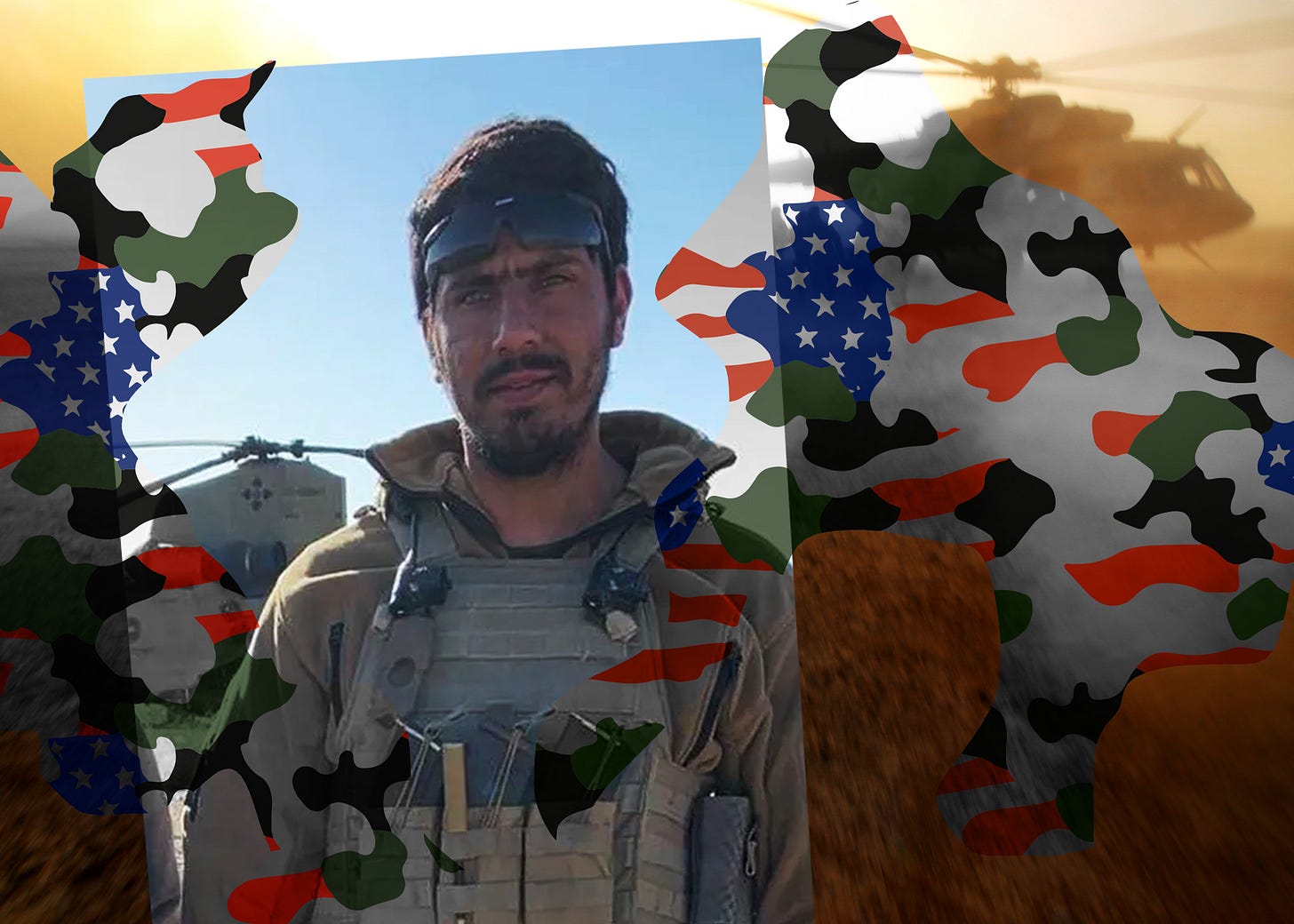He Saved Americans’ Lives in Afghanistan. Then an American Took His Life in Texas.
Why was the war hero’s killer allowed to walk free?

ON APRIL 27, 31-YEAR-OLD ADBUL RAHMAN WAZIRI was shot outside his apartment complex in Houston, where he lived with his wife and two young children. According to security camera footage, the shooter became frustrated when Waziri briefly double-parked in front of a mailbox to get his mail. Waziri’s family’s lawyer, Omar Khawaja, said the two men then engaged in a heated exchange before the shooter went back to his car to grab a weapon. With his hands raised, Waziri pleaded, “Please don’t shoot.” Seconds later, gunfire took his life.
The shooter later called 911 on himself. When the police arrived, he surrendered his firearm, and law enforcement took him into custody—but then, after questioning him, the police released the shooter without charges. Houston District Attorney Sean Teare, who initially declined to bring charges, said he may reconsider convening a grand jury.
“Let’s not kid ourselves: Had it been me or another American veteran killed over a parking spot, Sean Teare would have charged the shooter outright long ago,” Thomas Kasza, a former Green Beret and founder of the charity 1208 Foundation for Afghan veterans, told The Bulwark.
KASZA WAS REFERRING TO WAZIRI’S service with the American military, in which he saved countless American lives as a member of the elite National Mine Reduction Group (NMRG). American Green Berets trained NMRG members to preemptively detect mines, IEDs, and other explosive ordnance before the Green Berets and American Explosive Ordnance Disposal (EOD) technicians advanced. They went in first to protect not only the lives of Afghan local nationals but also their American brothers-in-arms.
“With a fairly high degree of confidence, I’d call sweeping IEDs during a special forces night raid the most dangerous job in Afghanistan,” said Kasza.
NMRG was a “family business,” whereby members were hired upon the recommendation of another member. Many NMRG members worked for nearly twenty years—almost long enough to qualify for a pension if they were American. However, as Afghan contractors, they received no such compensation.
A Green Beret who requested anonymity for fear of retribution told The Bulwark, “On missions where we drove, they were the lead vehicle, [or] often walking on foot in front of the vehicle and defusing or blowing up IEDs. On missions we flew to, they were the first ones off the helicopter, rushing into dusty uncertainty and leading the way for their American brothers.”
Nearly twice as many NMRG members were killed in action as Green Berets between 2015 and 2021, according to Kasza. Consequently, many Green Berets have a deep respect and trust for these men, and NMRG members were the only Afghan service members officially permitted to carry weapons on American bases. According to one special forces soldier, who requested anonymity for fear of retribution, they were “a group that was recruited, trained, paid by, and fought with the U.S. Army Special Forces—and fought with such bravery” that if they were American, “there would be a Medal of Honor ceremony once a month.”
Waziri spent more than five years with the NMRG. Ben Hoffman, a Green Beret who served alongside him in 2019, told The Bulwark, “He was a lion of a man but also one of the most gentle warriors I have ever seen.” He was so talented that he was selected to be an instructor—a role he held until NMRG members received their last paychecks in April 2021. Due to his close work with the U.S. military, Waziri had a price on his head when the Taliban retook Afghanistan.
Despite the enormous target on his back, he worked tirelessly to create safe houses for fellow Afghans to survive until they could secure a ticket to safety. Due to his extensive service, Waziri’s American special forces counterparts were able to initiate the process for him to obtain a Special Immigrant Visa. His flight to America departed just two hours before the ISIS-K attack on Hamid Karzai International Airport. Two months later, his wife and infant daughter joined him in Houston, where they put down roots and had a second child.
NOW WAZIRI’S WIDOW AND THEIR CHILDREN, 4 years old and 9 months old, have fled the state out of fear of living near the gunman. The inaction of the Houston Police Department and the prosecutor’s office has left the Afghan refugee community feeling rattled with fear and despair.
“We want answers,” Hamid Yousafi, a former special immigrant visa and current green card holder who resides in Houston, told The Bulwark. “Why is a cold-blooded murderer running wild? . . . How can we tell our children that following the rules will not get them in trouble?”
“I’m a lawyer. I understand how these cases unfold. . . . There’s no reason why we don’t even have the assailant’s name,” Hajji Omar, an Afghan-American citizen in Houston, told The Bulwark. Frustrated and seeking answers, members of the Afghan community have protested at the Houston Police Department in hopes that the police will give the case the attention it deserves.





